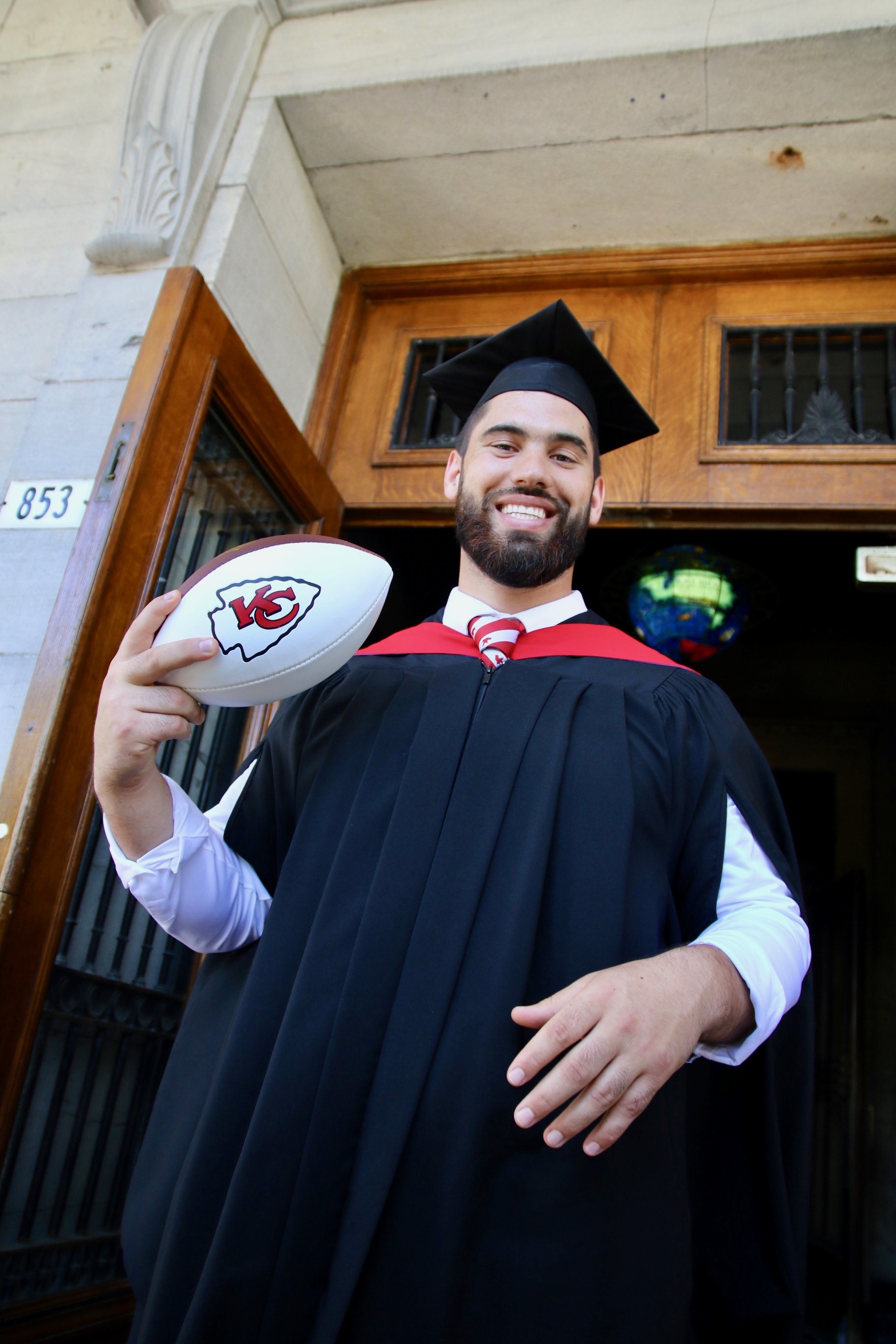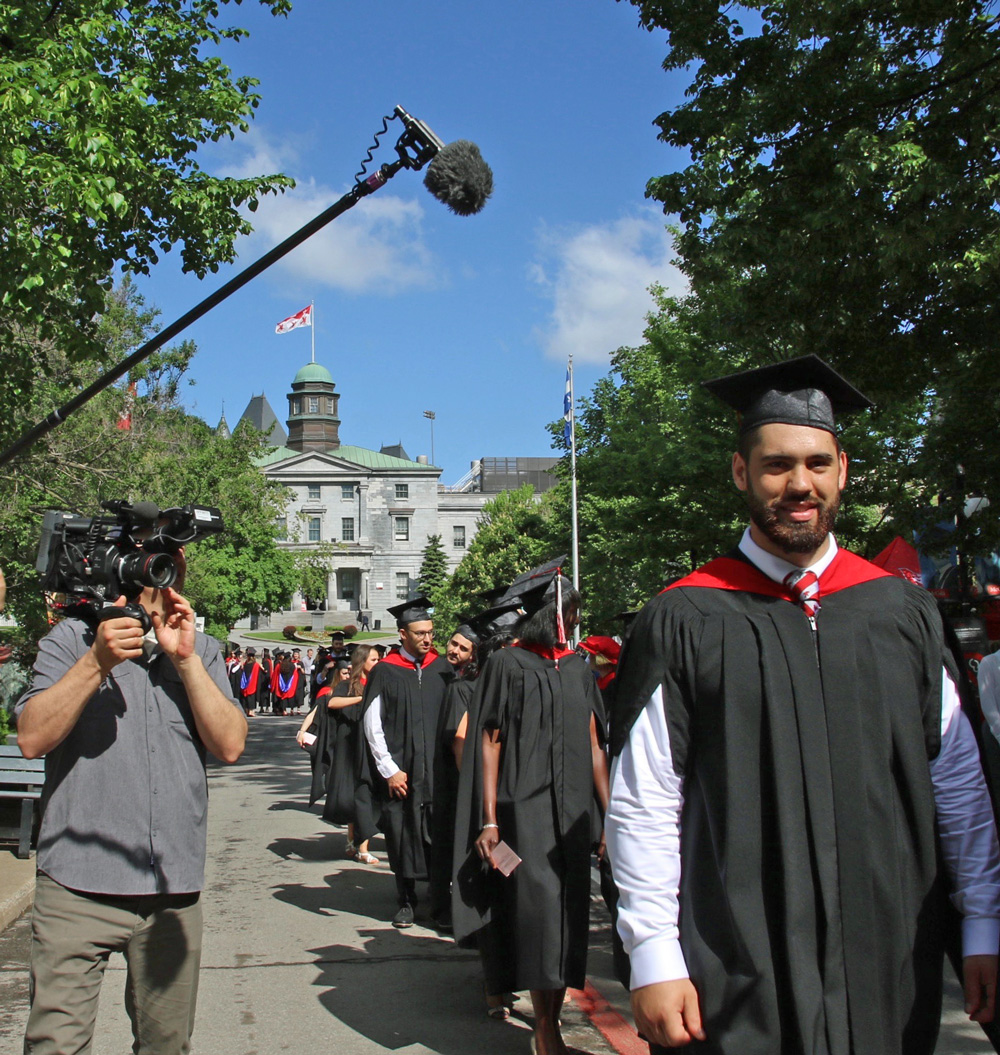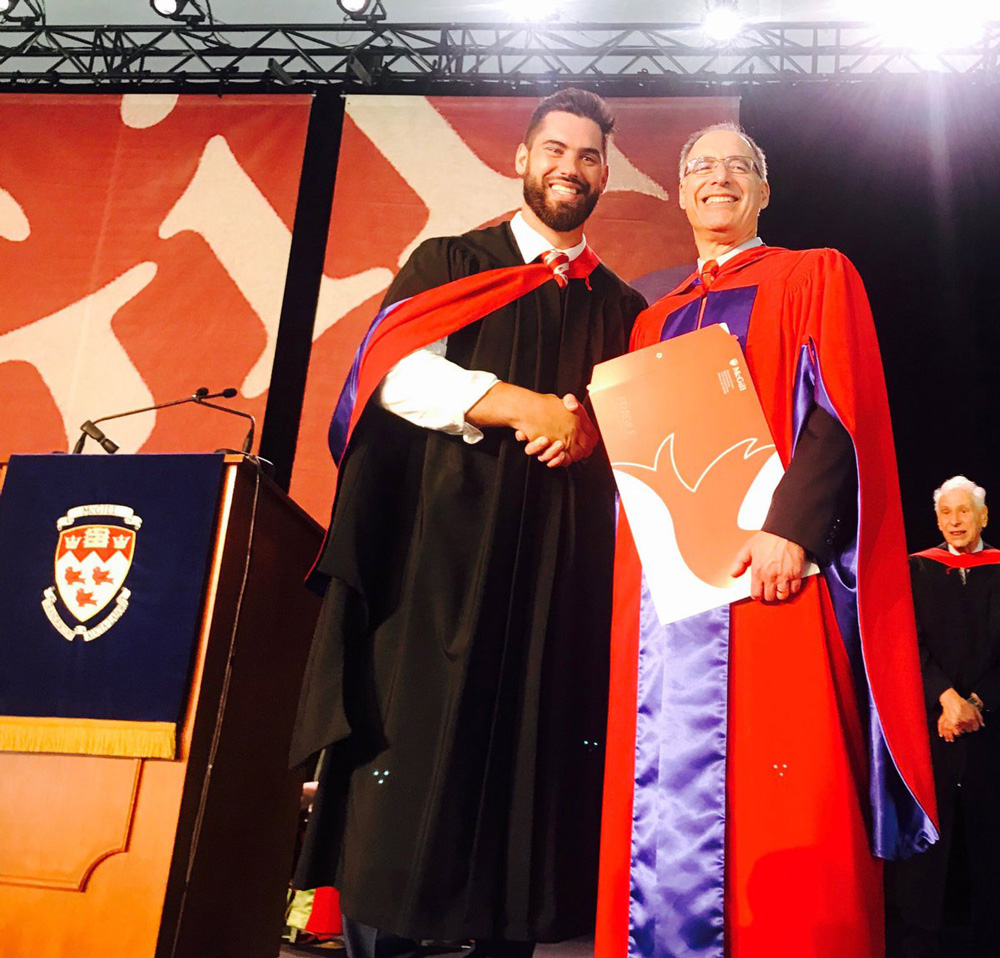Laurent Duvernay-Tardif, starting offensive guard for the NFL’s Kansas City Chiefs, stands in front of the Arts Building and fields questions from the media in both official languages.

Hours ago, the 6’5”, 325-pound giant strode across the stage during the Health Sciences Convocation ceremony, collected a bear hug from Principal Suzanne Fortier and accepted his degree in medicine – Medicinae Doctor et Chirurgiae Magister to be exact, or doctor of medicine and master of surgery. He is the first active player in NFL history to earn a degree in medicine.
Football and medicine. Medicine and football. It’s a unique dance the 27-year-old Duvernay-Tardif has been choreographing for eight years.
Unfazed by the semi-circle of cameras and microphones trying their best to contain a man of his size, Duvernay-Tardif answers each question with thoughtfulness and sincerity. But his smile speaks most eloquently of all. This is a man who has finished what he set out to do. And he is happy.
“This is the first time I am really proud of myself,” he says. “It’s the first time I’ve said to myself ‘I made it.’ ”
It’s quite a statement coming from man who is living every weekend warrior’s dream and who, last year, signed a lucrative contract extension worth $41 million. A French-speaking doctor known across the league for his size, athleticism and punishing play, Duvernay-Tardif has been called “the most interesting man in the NFL.”
“Don’t get me wrong, football is an awesome opportunity, and not everyone can make a living playing it. At the same time, being a doctor is more than [earning a living]. You get to treat people, you get to change lives. It is an honour to be part of this community and I take that responsibility very seriously. When I retire [from football] I want to be known as a good doctor.
“The past few years, I was coming back to Montreal thinking ‘Oh my God, I’m an NFL player, and the spotlight’s shining on me!’ But the next day, you start your round as a medical student and you realize that there is something other than football,” he says. “It gives you real perspective.”
Tricky balancing act
There, just a few metres to the side of James McGill’s grave, Duvernay-Tardif talks about the challenges he’s faced balancing his two passions.

Things did not begin auspiciously. His coming to McGill was a Plan B move, as he thought his difficulties in English would be too challenging. However, a missed entrance exam (he marked the wrong date in his agenda) on the French side meant McGill it was.
“At first I thought I was going to have to give up football so I could work on my English,” he says, his English now near-perfect. “But things worked out.”
Redmen coaches cut Duvernay-Tardif some slack when his hospital rotations coincided with practice. No wonder; his commitment was legendary.
He smiles when he talks about going straight to the stadium at the end of late-night shifts at the hospital so as not to miss morning practice. There in the locker room, he would make a bed out of towels and catch some much-needed sleep on the floor, knowing his teammates would wake him up in time to get suited up.
Football and medicine. Medicine and football. The dance continued.
On the first day of the NFL draft in 2014, Duvernay-Tardif was working in the neonatal intensive care unit, anxiously awaiting word of whether he would be selected.
Once drafted, he made it clear to the Chiefs that his intention was to finish his degree while playing – but that he would put his studies on hold entirely each football season.
When Duvernay-Tardif got the call from his agent about the contract extension in 2017, he was in Montreal doing his geriatrics rotation.
The two pursuits, polar opposites in so many ways, have always been inextricably intertwined. Duvernay-Tardif calls it “synergistic.”
Surrounded by support
Of all the people who have made an impact in his life, none mean more to Duvernay-Tardif than his parents. When asked how they helped him juggle his two pursuits, he pauses.

“I think it’s more than them just helping me divide my time. It’s about the education they gave me,” he says. “They didn’t raise me like a normal kid. I went to an alternative school. I was dancing and painting. My parents took my two sisters and I on a sailboat trip for two years. Those kinds of experiences – exploring the world, embracing new cultures, being curious – really helped me to be more open and taught me the importance of following my dreams. They taught me to live for my projects, not for money. When everyone was telling me that I was going to have to choose between football and medicine, they said I should pursue both my passions at the same time and be the first person to do it.
“They didn’t push me, they just supported me in whatever I did. It was really meaningful and it helped me become the man I am today,” he says.
In the NFL, Duvernay-Tardif found an ally in Andy Reid, the Chiefs’ gruff head coach, who was impressed with Duvernay-Tardif’s ambition. Reid may also have been influenced by his family’s ties to the University, his mother having earned her own medical degree from McGill. “Coach Reid told me ‘I want to help you because I think this will make you a better man.’ I don’t think I could have graduated without Coach Reid’s flexibility and understanding,” says Duvernay-Tardif.
He also stresses the important role played by McGill and the Faculty of Medicine over the course of his journey.
“Now that I’m standing here, I realize that I would never have made it to Kansas City if not for McGill. This was where I learned English; this was where I met the Shriners, who gave me the opportunity to play in the Shrine Bowl in Tampa Bay [and be seen by NFL scouts].
“When I made it to the NFL, I went to [Faculty of Medicine] Dean Eidelman and told him my plan [to play in the NFL while completing his medicine degree]. He was open and flexible and helped me with my project. I don’t think every university would have done that,” continues Duvernay-Tardif.
“I think it shows that McGill wants you to be a better human being and not just be someone with a degree. That’s something I will always remember.”
No down time
Typical of Duvernay-Tardif, just hours after finishing one epic journey, he’s already looking ahead. Asked what his next goal is, he laughs. “Winning the Super Bowl.”
Residency is definitely in his future, but he’s still working on the timeframe. “There will be a residency, I just don’t know when,” he says. “I’m still trying to figure out how that will happen with the Faculty of Medicine. I want to become a doctor and have a practice.”
For the time being, however, football will take priority. “I fly out tonight so I can be at practice tomorrow,” says Duvernay-Tardif. “No party tonight!”
****
Interviews finished, Duvernay-Tardif agrees to pose for photos in the doorway of the Arts Building. He’s even brought a Kansas City football for a prop. He makes sure each photographer has all the shots they need. When all is done, he walks down the concrete stairs, shaking people’s hands and thanking them for coming.
At the bottom he pauses to look up at the sun. He smiles again. It’s the smile of a man who is proud of what he’s done. Prouder still of what’s left to do.
